A black body staggers through history, hauling itself from the 19th century to the recent protests in Ferguson, Missouri, being knifed, dismembered and towed behind a pickup truck along the way. Noises throb in the air like helicopter blades as Moor Mother, AKA Camae Ayewa, tells her bloody tale, while saxophones screech and old blues singers float around her. This is her poem Creation Myth, which plays out like an 18-rated Black History Month condensed into five minutes.
It opens her album, Fetish Bones, which last year emerged into the global underground from her home in Philadelphia. Ayewa is now capitalising on its modest success with a European tour and a vinyl-only LP, The Motionless Present. She blends hip-hop, samples, spoken word and free jazz into MacBook collages that shudder with anger and pride, charting centuries of abuse against black people. Sampled voices include Sandra Bland, who killed herself in jail, three days after being arrested for a trumped-up traffic violation; and Natasha McKenna, a mentally ill teenager who, despite already being restrained, died after being tasered in prison.
I meet Ayewa in Hackney before a sold-out London gig. Lean and dressed in chaotically elegant layering underneath a bundle of braids, her face concertinas throughout our conversation, from happily screwed up to a flat pool of disbelief. Ayewa, however, is all too aware of how black bodies are looked at and framed. “I’m fetishised – my hair could be in a museum,” she says. “It’s disgusting, the lack of control we have over culture.”
She grew up in a public housing project in Aberdeen, Maryland, a poor, tightknit community. “We had our own stores in our apartments: the guy who fixed bikes, the candy-apple lady,” she says. “I had what I thought everyone else had. To us, that was our world, and it was very rich. But, looking around, there were people fighting with alcoholism and drug abuse.”
For Ayewa, America’s social housing is subjugation through architecture. “The design breeds violence,” she says. “There can be lead in the water, bedbug infestations. If you’re in a domestic violence situation and you call the cops too many times, you can get evicted, or if someone who was recently incarcerated is found in your home. It’s very oppressive.”
This environment wasn’t exactly a springboard into the music industry. As a girl, Ayawa did off-the-cuff rap, then later got into punk. But music was just a fantasy, “a wish upon a star. When would I ever see a drum kit? I didn’t know anyone who had one. I didn’t live near a store that sold them. But I had the stories, the rhythms, and that’s like so many people. We deem people who live in affordable housing to not have any talents, but they’re ready to explode with creativity.”
Ayewa paints a picture of a community cut off from the rest of culture, with only the occasional touchstone to remind them of who they are. “You remember the film Boyz n the Hood? We were like, ‘There’s black people in California! Whoa!’ It was huge. And I remember when Wu-Tang Clan came out with a video, everyone was so excited, ‘Yo, they’re smoking Philly blunts like us, they’re dressing like us!’”
She got into art school and met another female rapper freestyling at a party. They formed a duo, although they had no idea how to form the punk band they wanted. In the street one day, Ayewa saw a guy with an afro and a bass guitar and asked him to join. A drummer in a park turned her down, but recommended his kid brother. And so a band, the Mighty Paradocs, was born. They lied about their ages to get to play a regular night at a Philadelphia bar, and were astonished when other bands told them about going on tour. Still poor and with few role models, it seemed another wish upon a star.
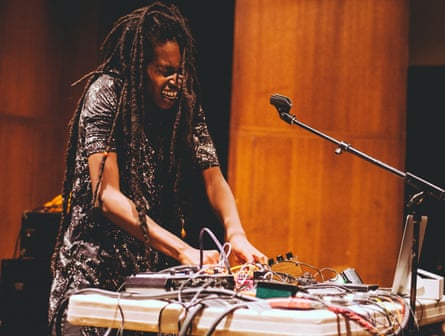
“We finally went on the road as a duo, Girls Dressed As Girls, but it took years. Before Fetish Bones, I still didn’t know how to record an album. I was crying. ‘What are the measurements for art – I don’t know this shit!’ It was a fucking struggle. I feel like it’s a miracle to tell my story on a world level now.” Fetish Bones was a solo record, but Ayewa also plays in a jazz band. “I’m on a roll. I want to keep learning, keep soaking it in.”
I wonder if the internet is changing things: has it given black Americans a public voice, an online community they didn’t have in the Boyz n the Hood days? She scoffs. “It costs $100 a month to have the internet in America – it’s naive to think everyone can afford it. The underground is still the folk root of everything, and that’s thriving. But to get the message heard by the world … it’s like The Truman Show – we can’t break through the bubble.”
Anyway, she’s happier with on-the-ground community projects, running workshops in Philadelphia with names such as Anthropology of Consciousness. “We go into different spaces, sit in silence and meditation, and think, ‘What has happened here?’ And then we go away and write about it. Without sounding like such a hippy, I believe in feeling the energy of a place, receiving messages in a natural way. Like when you’re outside and think, ‘Rain is coming.’”
Ayewa also wants to use poetry and music to alert listeners to the harsh, unfashionable realities ignored by film and TV. “Like speaking about what women go through in prison – nobody talks about that, unless it’s Orange Is the New Black, some dumb Hollywood shit. And we have yet to truly understand what enslavement means, what it does to a people. It’s programmed within us, there’s no way to escape it. The version of civil rights we’re sold, to be honest, is romanticised: a Band-Aid that solved the most horrifying thing in the world in eight years. How?”
There are also aggravating day-to-day things to handle. “As a woman, you have to be chill about so much,” she laughs drily. “I like hip-hop, but I have to deal with being called a bitch on the radio every day. I don’t use the N-word in my music, but in life I have to hear it all the time.”
Her vision extends beyond the US: she plans to tour housing estates in south London, writing poetry and finding echoes with her homeland. After a while, Ayewa starts referring, in a vague way, to “the oppressor”, needing shorthand for the multifarious violence she finds everywhere.
“I’m trying to study every place a black woman has been,” she says. “I’m finding out it’s endless. There’s something before being ‘black’ and we’re not taught that.” Hence the name Moor Mother, reclaiming a pre-modern black identity. “Our past has been distorted. Most people think we started with slavery, but we were explorers before that. We have to find that information for ourselves. People say to me at shows, ‘Thank you, I was losing a sense of my identity before I heard you.’”
Ayewa is an advocate of Afrofuturism, the movement that paints utopian prospects for black culture, and one of her workshops is called DIY Time Travel, helping people to imagine their futures. “That’s the first part of the solution: how do we learn from our past, to envision the future that we want? We need to understand what it means to love yourself. We’re going through a lot – fuck yeah, we are. But we still remain.”
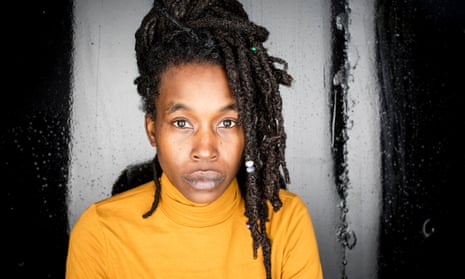

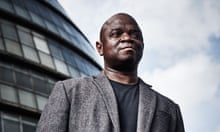

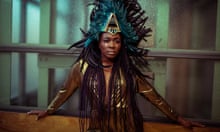
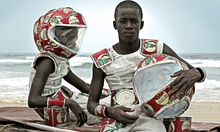



Comments (…)
Sign in or create your Guardian account to join the discussion